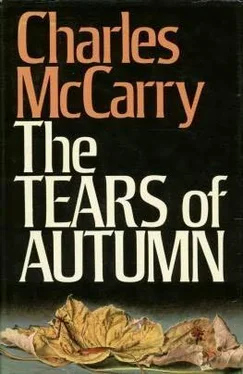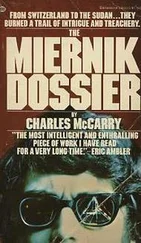Halfway to Saigon, Christopher saw shapes move in the darkness beside the road, a hundred yards ahead of the car. He turned on the headlights, bathing three armed men in their glare. One of them threw his arm in a floppy pajama sleeve across his eyes. Christopher turned off the lights and blew the horn. In the rear-view mirror he saw muzzle flashes, like the burners of a gas stove. There were no tracers; that gave him confidence. Rounds struck the road behind the car and ahead of it, but none hit the Citroen before it went around the next curve, rising with a sigh on its suspension, the steering wheel chattering in his hands.
As Christopher entered the city, the red sun touched a string of cirrus clouds on the eastern horizon. He looked at his watch and, remembering Luong, realized that he was late. He could see the shapes of buildings in the increasing light. The streets were still empty. There was the taste of dust in his mouth and his eyes burned from the strain of driving in the dark; he pulled the headlight switch and followed the yellow puddle of the low beams through the grid of Saigon’s streets. He parked the car five blocks from Honey’s room, locked it, and walked the rest of the way.
At the mouth of the alley, he met two Vietnamese. They had changed their white shirts for darker ones, but he recognized them. The men, walking rapidly, stopped when they saw him, then hurried by. Christopher turned around and watched them disappear into another alley; a motor scooter whined away, its rider shifting gears very rapidly.
Christopher climbed the stairs. The air smelled fresh, as if there had been rain in the night, and the sunrise washed across the roofs of the quarter. The boy was asleep again on the landing outside Honey’s room, sprawled on his back with one trouser leg pulled upward on his hairless calf.
Stepping over the sleeping figure, Christopher looked down. It was Luong, his eyes staring, his black hair blown forward as if by the wind. Christopher kneeled and touched his skin. It was still warm; there was a black stain on his trousers where his bladder had emptied.
Christopher pushed back Luong’s hair and saw the small blue hole on his smooth forehead. “He’s not your child,” he heard Wolkowicz say. Christopher laid his palm on Luong’s cheek and closed the eyes and the slack lips with his thumb and forefinger.
He opened the door. The Special Forces sergeant, wearing an identification bracelet with a delicate gold chain on his thick wrist, lay on his back with Honey in his arms. Her narrow body with its row of knobs along the spine rested easily on the sergeant’s chest; she had left her hair unbraided. They were breathing together softly. Luong’s killers must have used a silenced gun.
Christopher knelt beside Luong again and looked through his pockets. There was nothing for him there, or in the dead man’s clenched hands. He was not surprised; no agent had ever spoken a last message to Christopher before he died.
Christopher started the Citroen without checking it for bombs and wondered if the tension on his wrist when he turned the key might be the last sensation his brain would ever register. But the warm engine started normally, and he drove to the post office, where there were coin telephones. He called Wolkowicz and told him what had happened.
“Tell someone to get there fast, before the people in the neighborhood wake up and dump the body,” Christopher said.
“What difference does it make?” Wolkowicz said. “He was a politique -they won’t investigate, they’ll just close his file.”
“As long as they get the body. He has a wife.”
“All right, I’ll put out a call, but don’t expect any answers from the Vietnamese-if they went around solving murders in this town they’d never get anything else done.”
Christopher thanked him. “That’s okay,” Wolkowicz said. “Funny how things turn out, isn’t it? If he’d come back from Bangkok last month when he was supposed to, and they’d shot him then, his widow would’ve gotten a pension. But this sure doesn’t sound like death in line of duty.”
“It never does, after it happens,” Christopher said.
In the lobby of the Continental Palace half a dozen foreigners, Americans and Frenchmen, waited in two docile groups for the early minibus to the airport. Christopher had not slept for twenty-four hours or changed his clothes for forty-eight. The Frenchmen stared curiously at his rumpled suit and unshaven cheeks; he could tell by their clothes and the way in which perpetual impatience had twisted their faces that they lived in Vietnam. They were not used to seeing dirt on a white man, and it annoyed them.
The métis behind the reception desk, who had his father’s Norman nose and his mother’s small bones and almond eyes, spoke English to Christopher as a matter of course. He said he had no room. When Christopher replied in French, the métis pushed a registration card across the desk and took a key from the rack. “Pièce d’identité?” Christopher handed him his American passport, and the clerk gave back a resentful look- he had lost his first bribe of the day through trickery.
Christopher sent the bellboy for the suitcase he had left at the Alitalia office. He shaved and took a bath; the tepid water coughed from the tap, rusty and smelling faintly of the river. He sat down and wrote a letter to Patchen. Using the English section of a Collins French-English pocket dictionary, he converted the words he had written into groups of numbers corresponding to the page, line, and column where they were found in the book. It was not a satisfactory dictionary for use in a book code; heroin did not appear, and he had to render the word as “next-stage morphine derivative.” He might as well have been writing in German, he thought. Christopher burned the paper on which he had written his draft, and put the thin sheet covered with rows of numbers into an envelope with an American airmail stamp already affixed. He did not address the envelope.
Before he went to sleep, Christopher took no precautions apart from the useless one of locking the door. Precautions would serve no purpose. If Luong had been killed as a warning, Christopher himself would not be killed until whoever was running the assassins decided that Christopher had not taken the warning. The two men could have killed Christopher easily enough in the alley when they met him face to face. Or, if they wished to be artistic, they could have shot him after letting him discover Luong’s body. The killers had no distinguishing features, they looked like any other young Vietnamese sharing a motor scooter and looking for a way to make a little money out of the war.
Each time Christopher began to dream, he reached into that part of his mind and stopped the pictures. Nevertheless, he saw the man run down in Berlin again, and a youth in Algiers with a bullet coming out his back in a plume of blood as if he had thrown a glass of wine over his shoulder, and Luong’s photograph on a grave marker with a bright sacred heart glowing on his chest. While the Truong toe drank tea, Jean-Baptiste Ho showed Christopher pictures of all the Ngo dead, arranged among candles in the room in Siena where he had repeated to Molly that he loved her. Touching Christopher’s arm as if he were an old friend, the priest said, “It would be beautiful to die of disgust, but you will not.”
When Christopher awoke, he went to the American embassy and mailed his letter to Patchen, scribbling the false name and the post-office-box number in Washington across the envelope at the moment he dropped the envelope in the box. He knew it would reassure Patchen to see that the message had passed through the U.S. mail only. It was undecipherable without the book that was the key to the code, but ciphers are incriminating in themselves.
Читать дальше












